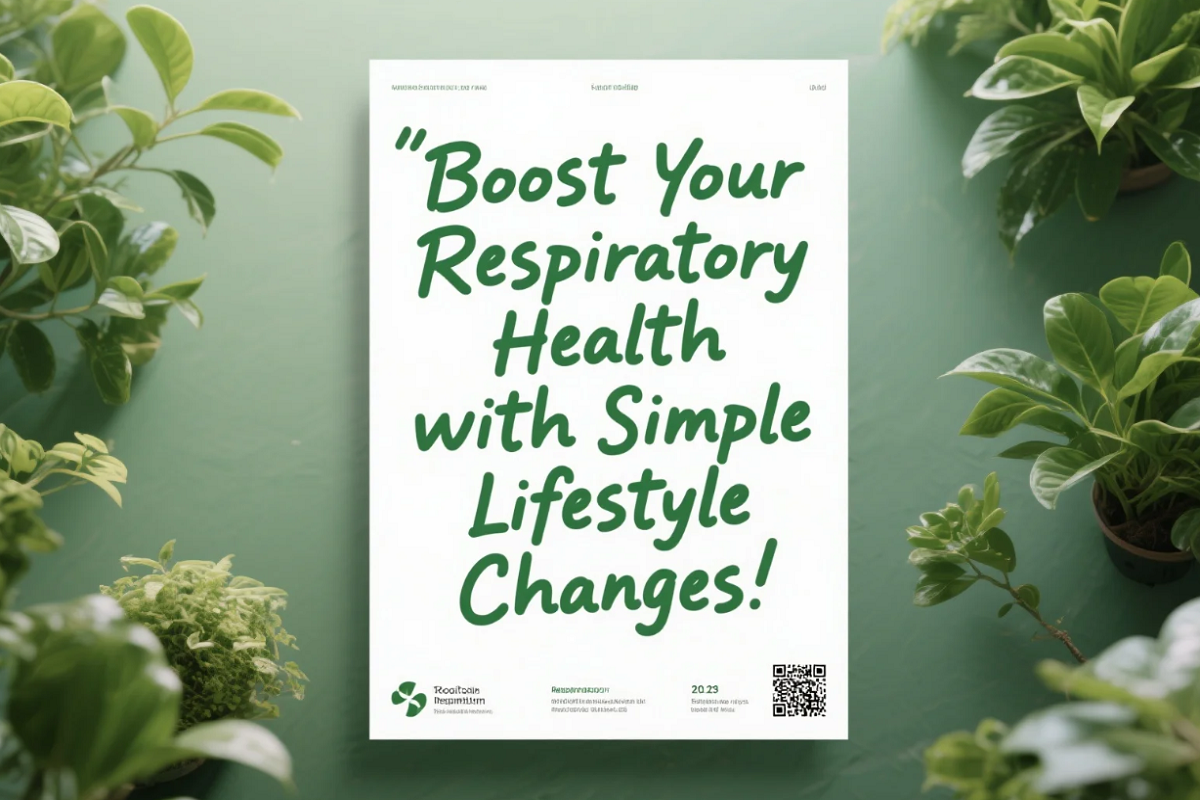Breathe Easy Again with These Simple Tips for Respiratory Health
-
104
- 20 Mar, 2025

Are you tired of feeling short of breath or dealing with respiratory discomfort? Whether you're struggling with seasonal allergies, asthma, or general respiratory concerns, you're not alone. Respiratory health is something we often take for granted, but when it's compromised, it can affect our daily lives and overall well-being. Luckily, there are several simple and effective tips you can incorporate into your daily routine to improve lung health, breathe easier, and feel more energetic.
In this article, we'll discuss the most practical strategies for maintaining and improving respiratory health. From lifestyle changes to easy-to-follow breathing exercises, you'll find everything you need to optimize your lung function and keep your airways clear.
What You Will Learn in This Article:
- How to naturally boost lung capacity and endurance.
- The best foods for respiratory health.
- Easy breathing exercises for better air intake.
- Lifestyle changes to support healthy lungs.
Let’s get started!
Understanding the Importance of Respiratory Health
Our respiratory system is critical in maintaining the balance of oxygen and carbon dioxide in the body. When it’s functioning optimally, we feel energized and our organs operate efficiently. However, environmental pollutants, poor habits, and even genetics can affect how well our lungs perform.
By learning how to nurture your respiratory health, you’re investing in your overall well-being. This not only helps you breathe better but also increases stamina, reduces stress, and prevents chronic respiratory diseases like asthma or chronic obstructive pulmonary disease (COPD).
1. Incorporate Breathing Exercises Into Your Daily Routine
One of the best ways to support your respiratory health is by incorporating breathing exercises. These exercises can improve lung capacity, increase oxygen intake, and reduce stress, all of which contribute to better lung function.
How to Practice Diaphragmatic Breathing
Diaphragmatic breathing, also known as abdominal or deep breathing, helps engage the diaphragm fully, improving lung efficiency. Here’s how to do it:
- Sit or lie down in a comfortable position.
- Place one hand on your chest and the other on your midsection. Take a slow, deep breath in through your nose, letting your belly expand as your diaphragm fills with air. Ensure your chest remains still.
- Breathe out gently through your mouth, allowing your abdomen to contract.
- Repeat for 5–10 minutes daily.
This exercise is particularly effective in strengthening the diaphragm and improving oxygen exchange in the lungs.
Pursed Lip Breathing for Better Airflow
Pursed lip breathing helps slow down your breathing rate and improves airflow, which is essential if you suffer from shortness of breath or conditions like asthma or COPD.
- Inhale through your nose for 2 seconds.
- Purse your lips as if you’re about to whistle.
- Breathe out gently through pursed lips, taking about 4 seconds to exhale.
- Repeat 5–10 times.
- 2. Eat a Respiratory-Boosting Diet
Did you know that the foods you eat play a vital role in maintaining your lung health? Incorporating the right nutrients into your diet can help reduce inflammation, improve your immune system, and protect your lungs from oxidative stress.
Best Foods for Lung Health
Fruits and vegetables: Rich in antioxidants, these help reduce oxidative stress, a factor that can damage lung tissue. Focus on vitamin C-rich options like oranges, berries, and leafy greens.
Omega-3 fatty acids: Found in fish like salmon, mackerel, and sardines, omega-3s can help reduce inflammation in the lungs and improve airflow.
Garlic and ginger: Both have anti-inflammatory properties and can support immune health, which is important for fighting respiratory infections.
Turmeric: Contains curcumin, which has anti-inflammatory properties and may help protect lung tissue.
Green tea: Rich in antioxidants, green tea can reduce inflammation and improve lung function over time.
Foods to Avoid for Respiratory Health
On the flip side, there are certain foods that can trigger respiratory problems or exacerbate existing conditions like asthma or allergies. These include:
Dairy items: For some individuals, they may lead to increased mucus production.
Processed foods: Often contain preservatives, artificial colors, and unhealthy fats that may inflame the respiratory system.
Refined sugars: Can worsen inflammation and mucus buildup.
3. Stay Active and Exercise Regularly
Exercise isn’t just good for your cardiovascular system—it’s also great for your lungs. Regular physical activity helps improve lung capacity and strengthens the muscles involved in breathing. Activities like walking, swimming, cycling, or yoga can significantly benefit your respiratory health.
How Exercise Improves Respiratory Health
Strengthens lung muscles: Exercise improves the efficiency of your diaphragm and intercostal muscles (the muscles between your ribs).
Increases lung capacity: By challenging your lungs during physical activity, you improve their ability to expand and contract, allowing more air to be taken in.
Enhances circulation: Improved blood flow helps deliver more oxygen to your organs, including your lungs, and speeds up the removal of toxins from your system.
Best Types of Exercise for Lung Health
Cardiovascular exercise: Activities like running, cycling, or swimming that increase your heart rate will also help increase lung capacity.
Yoga: Known for its deep breathing techniques, yoga helps improve lung function and flexibility while reducing stress.
Strength training: Builds muscle strength and enhances your body’s overall capacity for oxygen use.
4. Avoid Environmental Pollutants
Environmental factors like air pollution, secondhand smoke, and dust can all negatively affect your lung health. Minimizing exposure to these pollutants is a key part of maintaining clear airways and healthy lungs.
Ways to Avoid Pollution
Limit outdoor activity during high pollution days: If you live in a city with high levels of air pollution, check air quality reports and avoid strenuous outdoor activity when the air is heavily polluted.
Quit smoking: Smoking is the leading cause of chronic lung diseases like COPD and emphysema. Quitting is the most important step in improving your respiratory health.
Use air purifiers: Air purifiers can help reduce dust, pollen, and other pollutants in your indoor air, especially if you live in a highly polluted area.
Limit exposure to chemical fumes: Avoid inhaling strong chemicals found in cleaning products, paints, and perfumes. Choose natural or low-toxicity alternatives whenever possible.
5. Maintain a Healthy Weight
Maintaining a healthy weight is essential for overall well-being, and it can also have a significant impact on respiratory health. Excess weight can put strain on your lungs and diaphragm, leading to shortness of breath and even worsening conditions like sleep apnea.
How Weight Affects Lung Health
Increased pressure on the diaphragm: Excess weight can restrict your diaphragm's movement, making it harder for your lungs to fully expand.
Obesity and asthma: Studies have shown that obesity is a risk factor for developing asthma and can exacerbate symptoms in those who already have the condition.
Sleep apnea: Excess weight, especially around the neck area, can increase the risk of sleep apnea, which affects your breathing during sleep.
A balanced diet and regular exercise can help you maintain a healthy weight, which will directly benefit your respiratory system.
6. Stay Hydrated
Hydration is vital for maintaining respiratory health. Drinking plenty of fluids helps keep mucus in the airways thin, making it easier to breathe and clear out any trapped allergens or irritants.
Benefits of Staying Hydrated
Thins mucus: Proper hydration helps thin out mucus, reducing congestion and making it easier to breathe.
Keeps airways moist: Dry airways can irritate your lungs and exacerbate respiratory conditions. Drinking water helps maintain moisture in your respiratory system.
Flushes out toxins: Staying hydrated supports your body’s natural detox processes, helping remove harmful substances from your system.
Aim for at least 8 glasses of water per day, and consider adding herbal teas or natural fruit infusions to your routine for added hydration.
Breathe Easy Again
Respiratory health is essential for leading a fulfilling, active life. By incorporating these simple tips for respiratory health into your daily routine, you can improve your lung function, enhance your breathing, and reduce the risk of developing chronic lung diseases. Remember, small changes like improving your diet, exercising regularly, practicing breathing techniques, and avoiding environmental pollutants can have a huge impact on your overall lung health.
Take charge of your respiratory health today, and soon you’ll be breathing easier and feeling better every day.










